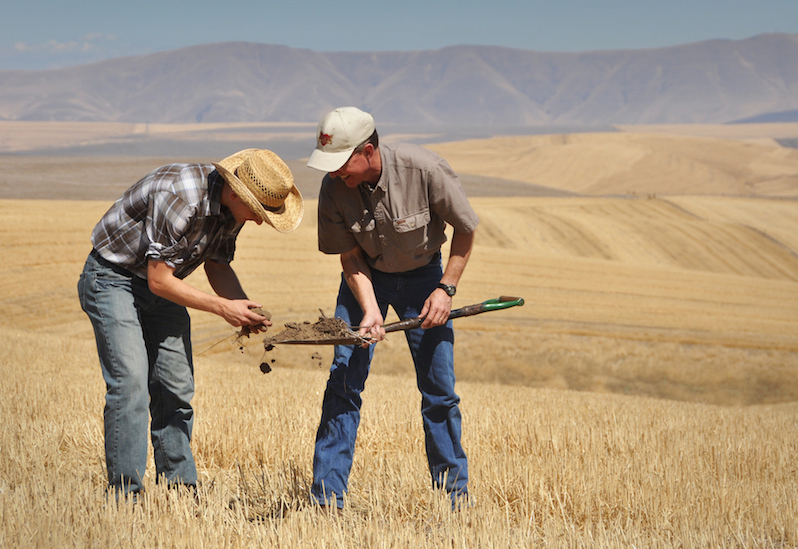USDA Discourages Staff From Using the Term ‘Climate Change’
Though not requested by Trump administration, the change may reflect how some staff are reacting to its values. U.S. Department of Agriculture soil conservationist Garrett Duyck, left, examines a soil sample on the Emerson Dell farm near The Dalles, Ore. (USDA / CC 2.0)
U.S. Department of Agriculture soil conservationist Garrett Duyck, left, examines a soil sample on the Emerson Dell farm near The Dalles, Ore. (USDA / CC 2.0)
U.S. Department of Agriculture employees are being discouraged from using the term “climate change,” instead being told to reference “weather extremes,” according to a series of emails obtained by The Guardian.
The emails, which come from staff at the National Resources Conservation Service, include other suggestions from Bianca Moebius-Clune, director of soil health for the NRCS. Instead of “Climate Change Adaptation,” for example, a recommended term is “Resilience to Weather Extremes.” Rather than “reducing greenhouse gases,” the emails suggest “Build Soil Organic Matter, increase nutrient use efficiency.”
The Guardian continues:
In her email to staff, dated 16 February this year, Moebius-Clune said the new language was given to her staff and suggests it be passed on. She writes that “we won’t change the modeling, just how we talk about it—there are a lot of benefits to putting carbon back in the sail [sic], climate mitigation is just one of them”, and that a colleague from USDA’s public affairs team gave advice to “tamp down on discretionary messaging right now”.
In contrast to these newly contentious climate terms, Moebius-Clune wrote that references to economic growth, emerging business opportunities in the rural US, agro-tourism and “improved aesthetics” should be “tolerated if not appreciated by all”.
Perhaps surprisingly, CNN reports that the language changes were not directly requested by the Trump administration:
“These emails, sent in the first days of the new administration to a small number of agency staff, did not reflect the direction of senior agency leadership,” NRCS spokesman Kaveh Sadeghzadeh told CNN.
The NRCS is an arm of the Agriculture Department that advises and assists farmers on topics ranging from finance to conservation.
The language changes were discussed as a messaging shift, not a change in mission.
“We won’t change the modeling,” one NRCS official wrote. “Just how we talk about it—there are a lot of benefits to putting carbon back in the soil, climate mitigation is just one of them.”
The reasoning, another NRCS official said: “It has become clear one of the previous administration’s priority (sic) is not consistent with that of the incoming administration. Namely, that priority is climate change.”
It seems the language changes may have been recommended as a way to talk about environmental issues while avoiding hassle from Trump appointees. In July, the president announced he would nominate a nonscientist, his longtime campaign aide Sam Clovis, to head the USDA. Clovis has described climate change as “junk science” and climate science as “not proven.”
USDA staff has reportedly been resistant to the suggested changes, with one employee’s internal email stating that “we would prefer to keep the language as is” and stressing the need to maintain the “scientific integrity of the work.”
The suggestions come during an administration that questions the scientific consensus on the human impact on climate change—and were made public the same week that a new report on the drastic effects of global warming was leaked to The New York Times. The scientists who worked on the report leaked it out of concern that the Trump administration would suppress their findings. During the presidential primaries, Trump infamously suggested that climate change was a Chinese hoax.
Mentions of climate change have been removed from the White House and Department of the Interior websites.
Your support is crucial…With an uncertain future and a new administration casting doubt on press freedoms, the danger is clear: The truth is at risk.
Now is the time to give. Your tax-deductible support allows us to dig deeper, delivering fearless investigative reporting and analysis that exposes what’s really happening — without compromise.
Stand with our courageous journalists. Donate today to protect a free press, uphold democracy and unearth untold stories.






You need to be a supporter to comment.
There are currently no responses to this article.
Be the first to respond.